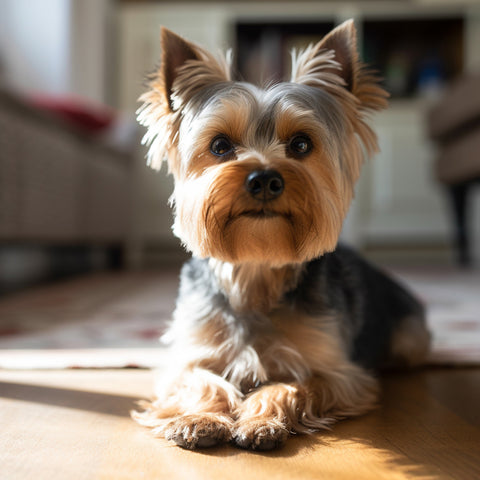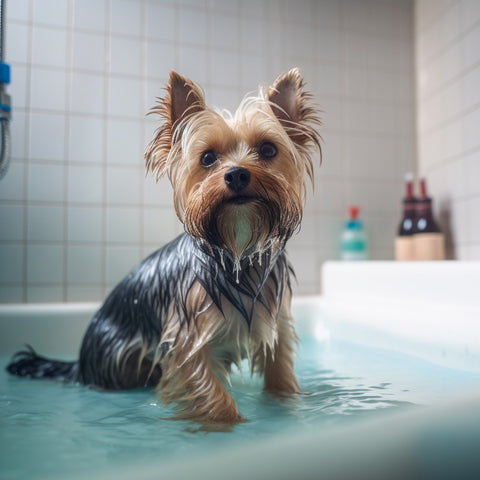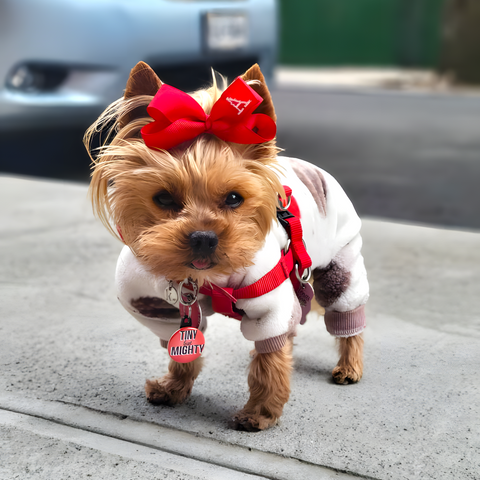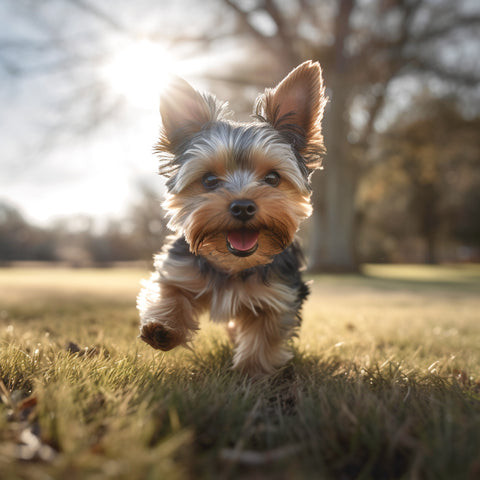How to Raise a Happy Yorkie Puppy: Complete Care Guide
A Yorkie puppy will bring happiness to your home, but these small dogs need special attention to stay healthy. Yorkies are active and loving pets despite their small size, and they can make great family pets if given the right care. If you are wondering how to raise a happy, well-behaved Yorkie, then you will find everything you need right here.
Setting Up Your Home for a Yorkie Puppy
Essential Safety Items
| Item | Specifications | Why It's Important |
| Harness | H-style, 2-3 oz, adjustable chest/neck | Protects fragile trachea, safer than collars |
| Playpen | 24" height minimum, secure bottom | Creates safe play space, prevents escapes |
| Pet Stairs | 4" max rise, foam-based | Prevents joint strain, allows furniture access |
| Safety Gates | Sturdy, small gap spacing | Controls access to dangerous areas |
| Puppy-Proof Supplies | Cord covers, cabinet locks | Prevents accidents and chewing hazards |
Creating Comfort Zones
To have your Yorkie feel totally at home, start in their individual comfort zones. This is what they need:
- Choose an orthopedic bed (18x14") with high sides for security and support
- Place beds in quiet, draft-free areas in your home
- Choose puppy-specific chew toys with a dog rating under 5 pounds
- Provide puzzle feeders such as Kong X-Small to give mental stimulation
- Create many cozy spots in your home for napping
Setting Up Their Personal Space
Your Yorkie needs a den-like space to call their own. Here's how to set it up right:
- Select an 18x18" crate—large enough to fit comfortably but small enough for them to occupy alone
- Put the crate in a family room, but not the busiest areas
- Add soft bedding and familiar-smelling items
- Start with brief crate periods and build up the length of time
- Make the crate a positive experience and never use it as a punishment
Bathroom Area Setup
Getting the bathroom setup right from day one makes training much easier. Follow these guidelines:
- Establish a dedicated potty spot away from sleeping and eating spaces
- Use pee pad holders to prevent them from sliding and causing a mess
- For potty breaks outdoors, choose a spot close to your entrance
- Keep enzymatic cleaners within reach
- Use UV lights for spot cleaning effectively
- Follow routine cleaning schedules to prevent repeated accidents
Clothing Essentials for Your Yorkie
- For indoor comfort, get 2-3 light cotton tops or dog sweaters that are machine washable and easy to slip on with Velcro or easy snaps.
- Keep your Yorkie covered outside with a water-repellent dog raincoat and a dog winter coat to block cold temperatures below 45°F.
- Get protective boots for walking on hot pavement or in snow, and look for clothing with reflective strips for visibility for nighttime walks.
- Make sure all dog clothes fit well—you must be able to place two fingers between your dog's body and the clothing, and the length should be slightly below the bathroom area.
- Always watch your Yorkie when he is wearing dog clothes, and remove any that are scratching or resulting in movement problems.
Feeding Your Yorkie Puppy
Daily Feeding Schedule
For the first three months, your Yorkie puppy needs four small meals daily, spaced about 4 hours apart. Each meal should be 1-2 tablespoons of high-quality puppy food. From 3 to 6 months, reduce to three meals daily with 2-3 tablespoons per serving. After 6 months, transition to two meals per day. Watch your puppy's energy level carefully—some will need an extra meal depending on the activity.

Choosing the Right Food
Pick puppy food with at least 22% protein and 8% fat, designed for small breeds. For sensitive-stomached puppies that exhibit signs such as loose stools or itching, a grain-free variety may be beneficial, but always consult your vet before changing foods.
Preventing Low Blood Sugar
Yorkies under 3 pounds are especially prone to hypoglycemia and can become weak, confused, and shaken. Never let your puppy go more than 4-5 hours without eating during the day. Keep high-calorie supplement gel like Nutri-Cal available for emergencies. A small amount of honey can provide a temporary boost if needed.
Water and Treats
Provide fresh water in a shallow bowl to prevent drowning risks. Avoid all table scraps during the puppy stage to prevent digestive issues and picky eating. Limit treats to no more than 10% of daily food intake, choosing only those made for small-breed puppies.
Weight Monitoring
Track your puppy's weight weekly—healthy Yorkie puppies typically gain 2-4 ounces per week until reaching about 3-4 pounds. Their adult weight should be 4-10 pounds at one year old. If your puppy's weight gain is too slow or too fast, inform your vet because their feeding schedule might need to be adjusted.
Grooming Your Yorkie Puppy
Daily Coat Care
A Yorkie's signature silky coat requires consistent care to stay healthy and beautiful. Start with daily brushing using a high-quality pin brush, working from the skin outward in small sections. Pay special attention to areas where matting commonly occurs: behind the ears, under the legs, and around the collar area. Here's a detailed grooming schedule to follow:
Basic Grooming Schedule
| Frequency | Task | Tools Needed | Special Notes |
| Daily | Gentle brushing | Pin brush, metal comb | Start at the base of hair, work up |
| Every 2-3 days | Face cleaning | Pet wipes, soft cloth | Focus on eye area |
| Weekly | Deep brushing | Slicker brush, detangling spray | Check for mats |
| Every 2-3 weeks | Full bath | Dog shampoo, conditioner | Use lukewarm water |
| Monthly | Nail trimming | Pet nail clippers | Cut only tips |
Bathing and Drying
Use a puppy-specific or hypoallergenic shampoo with a pH between 6.5-7.5. Water temperature should be lukewarm, and always protect their ears with cotton balls. After shampooing, apply a moisturizing conditioner designed for long-haired dogs. Proper drying is crucial—use a low-heat setting on your dryer and keep it 6-8 inches from their coat.

Dental Health Routine
Yorkies are prone to dental issues, making oral care essential from puppyhood. Begin teeth brushing with this schedule:
Dental Care Timeline
| Age | Activity | Frequency |
| 8-12 weeks | Introduce toothbrush | Once daily |
| 3-6 months | Regular brushing | Twice daily |
| 6+ months | Full dental routine | Morning and evening |
Professional Grooming
Schedule professional grooming every 6-8 weeks for:
- Proper coat trimming
- Sanitary area maintenance
- Nail care and pad trimming
- Ear cleaning and inspection
Remember to use positive reinforcement during grooming sessions. Start with short sessions and gradually increase the duration as your puppy becomes more comfortable with the routine. Keep grooming supplies in a dedicated area and always check tools for wear and damage before use.
Essential Health Care Guide for Yorkie Puppies
Critical Health Issues You Must Know
Yorkshire Terriers require special attention to their unique health challenges, particularly during their first year of life. Understanding these conditions can help you provide prompt and effective care for your puppy.
Hypoglycemia (Low Blood Sugar)
Hypoglycemia is a critical risk to Yorkie puppies, especially those weighing under 3 pounds. Your puppy can show alarming symptoms such as severe lethargy, uncontrollable shivering, fogginess of mind, and general weakness. Always keep emergency supplies like Nutri-Cal or natural honey in your home and travel kit. Maintain a strict feeding schedule with food every 4-5 hours during puppyhood to prevent life-threatening blood sugar collapses.
Luxating Patella (Kneecap Dislocation)
Luxating Patella is a prevalent orthopedic disorder that affects many small breeds, and it may hinder your Yorkie's mobility and quality of life. Watch for signs like abnormal skipping while walking, sudden lameness in hind legs, or refusal to jump onto the furniture. Maintain your puppy at their optimal weight through proper feeding and exercise to reduce stress on their joints. Mild cases can be managed with the assistance of a veterinary physical therapist, but severe cases can be managed with surgery for maximum benefit.

Preventive Care Essentials
Protecting your Yorkie's health requires a proactive approach combining regular monitoring with preventive measures. Here's what you need to know:
- Weigh your puppy weekly on a precise digital scale to ensure healthy growth patterns.
- Provide exercise sessions on carpet, grass, or rubber mats to protect developing joints from hard surfaces.
- Administer monthly parasite prevention medication regularly to protect against heartworms, fleas, and intestinal parasites.
- Schedule quarterly veterinary visits during the first year to track progress and address potential health problems early on.
- Maintain accurate records of your puppy's growth, vaccinations, and any variations in their health to present to your veterinarian.
Comprehensive Vaccination Schedule
| Age | Required Vaccines | Additional Care |
| 6-8 weeks | First DHPP | Initial deworming, First vet exam |
| 10-12 weeks | Second DHPP, First Bordetella | Continued deworming, Weight check |
| 14-16 weeks | Final DHPP, Rabies | Start heartworm prevention |
| 16+ weeks | None | Begin controlled socialization |
| 6 months | Booster shots if needed | Consider spay/neuter |
| 1 year | Annual boosters | Complete health assessment |

Instagram:appletheyorkie1
Hedgehog Pajamas
Training, Socialization, and Exercise Guide for Your Yorkie
Early Development Essentials
Yorkies thrive on structured training combined with appropriate physical activity from an early age. Creating a balanced routine that incorporates both mental and physical stimulation will help develop a well-adjusted, happy puppy.
Housebreaking and Basic Training
| Time of Day | Activity | Duration | Key Points |
| Morning | Potty Break | 15 mins | Immediately after waking |
| After Meals | Potty Break | 15 mins | Within 15-20 mins of eating |
| Mid-Day | Training Session | 10 mins | Basic commands & rewards |
| Evening | Final Potty | 15 mins | Last bathroom trip before bed |
Successful house training relies on:
- Establishing consistent feeding and potty schedules
- Using positive reinforcement with immediate treats and praise
- Creating a designated potty area with familiar scent cues
- Monitoring water intake, especially in evening hours
- Maintaining patience through the learning process
Socialization and Exercise Plan
Proper socialization during the critical period (8-14 weeks) shapes your Yorkie's future behavior. Combine these activities with appropriate exercise levels:
Daily Activity Schedule
| Activity Type | Duration | Frequency | Notes |
| Indoor Play | 10-15 mins | 2-3x daily | Use soft toys, gentle games |
| Structured Walks | 20 mins | 2x daily | After full vaccination |
| Training Games | 5-10 mins | 3-4x daily | Include mental challenges |
| Social Interaction | 15-20 mins | 1-2x daily | Supervised meetings |
Mental Stimulation
- Keep your Yorkie's mind sharp and engaged by making mealtimes more interesting with puzzle toys that dispense treats or kibble.
- Create exciting sensory experiences by introducing different textures and surfaces during playtime—try carpet squares, rubber mats, or crinkly paper.
- Make learning fun with hide-and-seek games using their favorite toys, which helps develop problem-solving skills.
- To prevent boredom, swap out their toys each week—this simple rotation makes old toys feel new and exciting again.

Safe Exercise Options
Since Yorkies are tiny but energetic, focus on gentle activities that won't strain their delicate bodies.
- Indoor fetch with soft plush toys provides great exercise while protecting their joints.
- Short sessions of gentle tug-of-war can be fun, but always use appropriate-sized toys and let them win occasionally.
- Allow your puppy to explore secure, enclosed areas under your watchful eye—this builds confidence and satisfies their natural curiosity.
- For more structured activity, try simple agility exercises like walking through tunnels or stepping over low obstacles, keeping everything low-impact and age-appropriate.
Always keep your Yorkie puppy under close supervision during exercise and play. When they are over-panting and trying to calm down, stop. Keep fresh water available at all times. Protect their tiny joints by not exercising on hard surfaces like concrete. Grass and carpet are much better options. Break it up into a number of short 5-10 minute sessions of playtime instead of one long session of exercise.
Never let your Yorkie play unsupervised with other dogs, not even when play is friendly. Their courageous personality will make them not know their own size. Play with mates of the same size when possible, and prepare to intervene when play becomes too boisterous.
Begin Your Happy Life with Your Yorkie Now
Taking a Yorkshire Terrier home puts everything into perspective—for the best! With such big personalities packed into such a small package, these little pooches steal our hearts. Although we've gone over diet, training, and routine, your Yorkie will probably need something more. Tune in to your intuition and follow your lead. The most significant thing is time spent together—the rest will come naturally. Keep vet check-ups on a regular schedule and give them as much attention as possible, and your little pooch will become a content, self-assured friend who inserts joy into your days and love into your life.














